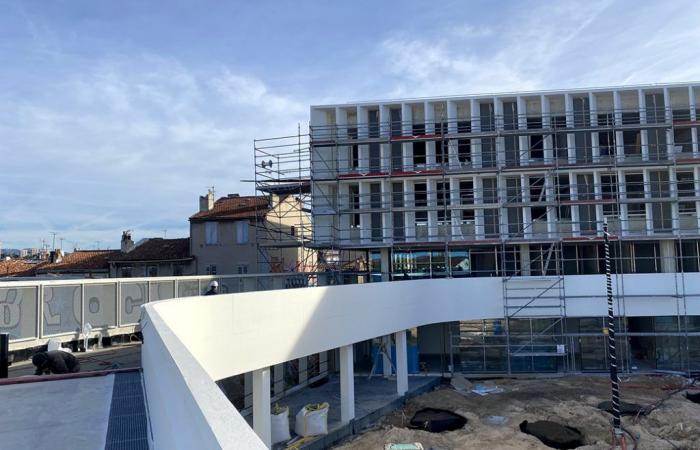Work is progressing despite State monitoring that could be improved and doubts in the medium and long term about the sustainability of the project, these are the main conclusions of the information report presented on June 19, 2024 by Isabelle Briquet, senator of Haute-Vienneet Stéphane Sautarel, senator of Cantalon the financing of the “schools” component of the “Marseille en grand” plan.
Launched on September 2, 2021 by the President of the Republic and endowed with five billion euros, this plan aims to catch up on the delays accumulated by the municipality in the development of “major services” for the population, including schools. “Faced with a finding of widespread deterioration of school buildings, the city of Marseille, unable to catch up within a reasonable time frame with the long-standing and recurring lack of maintenance of schools, has requested State aid,” the rapporteurs specify.
As part of the initial finance law for 2022, the State has opened an envelope of 254 million euros for the renovation of 188 schoolswhich was increased in December 2021 by a second envelope of 150 million, or more than 400 millions au totalThis sum is to be used to make schools safe and up to standard, as well as to improve energy performance and reduce social inequalities. The plan also provides for the creation of new establishments.
First deliveries at the end of 2024
To carry out the operation, the city and the State created a local public company for development of national interest (Spal-IN), the Public Society of Marseille Schools (Spem). This was entrusted with carrying out the renovation and construction operations of the schools. While the total amount of the work is estimated at around 850 million euros, the framework agreement is set at 1.8 billion euros to take into account studies, interim financial costs, compensation for losers, etc. For the rapporteurs, this method has an advantage: it initially involves the investment debt being transferred to a structure other than the city of Marseille.
Nowadays, Fourteen schools are under constructionten of which should be delivered by the end of 2024. According to the report, Spem “is currently demonstrating its effectiveness”. Not only are the projects moving forward, but the first achievements “show undeniable design qualities and consideration of climate change”. However, the mission qualifies: this good progress is largely due to the fact that work on seven sites had already been launched by the city – which had implemented a renovation plan in 2017 – and was simply transferred to Spem.
Another positive point: “this colossal and unprecedented project on a city scale is the subject of strong political support” and the monitoring carried out by the city, Spem and the prefecture is “very regular and precise”. The mission nevertheless underlines that this monitoring deserves “to be formalized and to be the subject of indicators and reporting tools shared by all stakeholders”.
No contractualization between the city and the State
On the other hand, when it comes to assessing the State’s monitoring, the rapporteurs are more critical. On “Marseille en grand” in general, they highlight a “lack of structuring framework”: “This plan has not been the subject of any contractualization between the city and the State and is not materialized by any roadmap likely to break it down by areas, by objectives and by actions and to establish a precise implementation schedule for each of the components”.
This criticism particularly targets the financial aspect: “The credits allocated by the State […] are not monitored in a consolidated manner, so that the total amount of the State’s financial effort is not only very unreliable but also variable over time.” Despite their “repeated” requests, the special rapporteurs were unable to gain access to the documents relating to this monitoring.
On the schools part of the plan – an “unprecedented intervention by the State, in an area of competence falling exclusively under the jurisdiction of the municipalities” – monitoring and framing could, here again, “be greatly improved”. Among the points of vigilance, the two senators note “doubts” about the ability to maintain the ten year calendar to renovate and build 188 schools, and a “delta of more than 65 million euros compared to the increased envelope without any precision as to their origin”. In other words, the more than 400 million euros promised by the State are not to date fully guaranteed.
Fear about the future
Finally, the report anticipates: from the date each school is made available, the city of Marseille will have to pay Spem a fee spread over twenty-five years, an investment that could reach 103 to 113 million euros per year, in other words, 30% of the city’s average annual investment, all “in a context where the municipality has significant investment ambitions in other areas”. And that’s without counting the cost of maintenance and major upkeep that the city will take over at the end of its twenty-five years and which will raise the question of the human and technical resources to deal with it. For the mission, the question of the long-term sustainability of the entire operation therefore arises.
Among its recommendations, the mission asks the State to to guarantee the 400 million euros announced for the “schools” section of the “Marseille en grand” plan, but also that a consolidated document be drawn up, shared between the stakeholders, specifying the sites, schools and the nature of the work envisaged for each of the waves of work, and on the other hand, a plan for the gradual resumption by the city of the maintenance of the schools renovated and built by Spem, providing for the related costs and the necessary human and technical resources.






